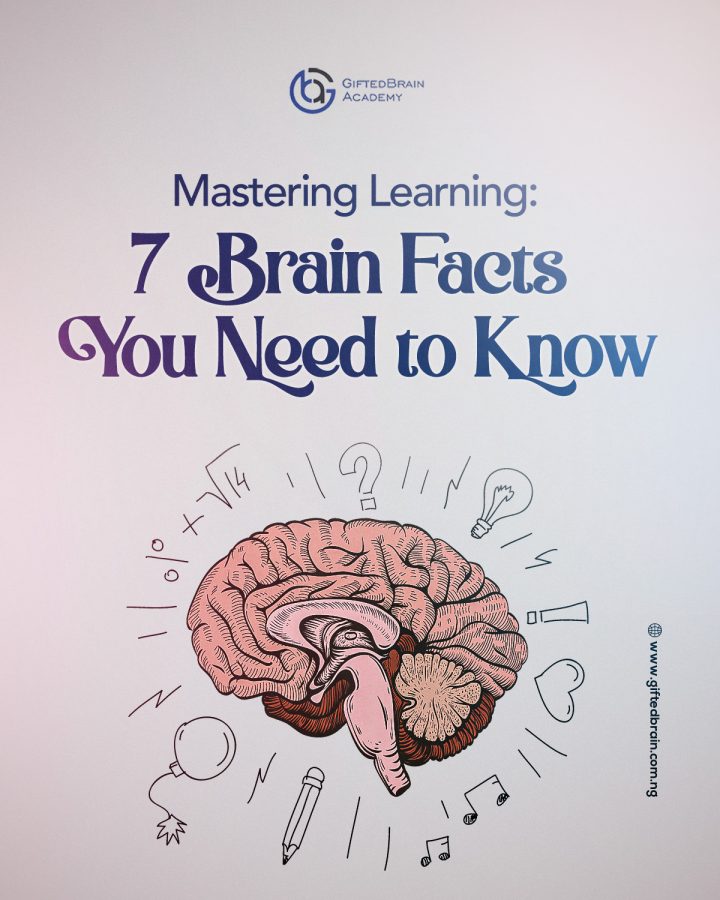Did you know that it’s Brain Awareness Month? This is a perfect opportunity to enhance your learning by understanding some fascinating facts about the brain. Equipping yourself with this knowledge will empower you on your journey in mastering learning.
The study of the human brain is a field that scientists have not fully explored yet. Even experts admit that there is a lot more we don’t know about the brain than we currently do know. However, we know a few important things about how the brain and learning are connected. Here are seven key findings and brain facts scientists have made so far:
1. You can trick your brain to enhance your performance
In general, trying to multitask is not a good idea because it’s impossible to truly focus on multiple things at once. When we think we’re multitasking, we’re actually just switching back and forth between tasks, resulting in lower productivity compared to focusing on one task at a time.
However, a study published in the journal, Psychological Science, suggests that we can actually improve our performance on certain tasks by tricking ourselves into thinking we’re multitasking, even if we’re not. In the study, participants were divided into either a multitasking or single-task group. Those in the multitasking group were told they had to work on two tasks simultaneously, while the single-task group was told they would focus on one task that tested their learning and writing skills.
Interestingly, participants who believed they were multitasking performed better than those in the single-task group every time. They were also more focused and engaged with the task. The researchers explain that this finding doesn’t contradict previous evidence showing the negative effects of multitasking. Instead, it shows that our perception of multitasking can have a positive impact on our performance.
Therefore, breaking down a larger task into its various components and treating it as multitasking can help us complete the task more efficiently, even if we’re not truly multitasking. For example, during a meeting, we may consider it as one task, but in reality, we are engaging in multiple tasks like taking notes, listening, and forming opinions.
2. Your brain is a smart filter, carefully selecting what to learn
Despite being exposed to a constant influx of new information, we don’t retain all of it equally. Stanford University researchers embarked on a study this year to understand how the brain filters incoming information and determines which sounds, sights, and sensations are significant.
One of it is the Reticular Activating System (RAS) which we can take advantage of for learning.
The reticular activating system (RAS) is a network of neurons located in the brain stem that spans through the hindbrain, midbrain, and hypothalamus. Despite its small size, the RAS plays a vital role in learning and information processing.
One of the key functions of the RAS is to act as a filter for sensory information. It helps the brain determine what stimuli should receive attention and what can be disregarded. By filtering out irrelevant or unnecessary information, the RAS enables the brain to focus on essential elements and optimize the learning process.
For example, when you consciously decide to look for the colour blue in your surroundings, you activate the RAS. The RAS then starts filtering incoming sensory information, giving priority to stimuli related to the colour blue. As a result, you become more attuned to noticing objects, items, or elements that are blue, while other details that are not relevant to your search may fade into the background.
This example illustrates a good way to guide the brain and help it in filtering information.
Additionally, the RAS plays a crucial role in directing attention and promoting engagement. It helps in guiding our conscious awareness towards specific tasks, goals, or intentions. By activating the RAS through conscious direction, such as setting clear intentions or using precise language, we can enhance our learning capabilities and improve information retention.
While it is known that specific brain regions are involved in processing feedback and facilitating learning, this alone does not provide a comprehensive understanding of the learning process. Humans and animals alike need to discern what information is worth learning from and how to distinguish valuable feedback from background noise.
3. The temperature of your learning environment can impact your learning capabilities, either enhancing or hindering your ability to absorb new information.
When we sit down to study, the temperature of our study environment may not be a factor we typically consider. However, a study conducted in the United States on behalf of the National Bureau of Economic Research sheds light on its significance. The study analyzed the test scores of 10 million students in the tenth and eleventh grades and discovered a link between classroom temperature and academic performance.
Remarkably, the researchers found that for every one-degree Fahrenheit increase in classroom temperature, there was a corresponding one percent decrease in learning. This correlation can be attributed to the difficulty of focusing and learning when we are physically uncomfortable. Thus, it is crucial to have access to a study space where the temperature is neither too hot nor too cold, ensuring a comfortable environment that promotes optimal concentration and learning.
According to the Organisation for Economic Co-operation and Development (OECD), students who have the privilege of accessing high-quality learning environments are more likely to achieve academic success. These conducive environments not only contribute to academic performance but also have a favorable influence on students’ social and emotional well-being.
4. Forgetting enhances your ability to learn and retain information more effectively
To enhance focus, it is essential to eliminate or disregard sources of distraction. There are three aspects that you should forget for optimal focus.
Firstly, it is important to forget what you already know. When approaching new knowledge, there is a tendency to overestimate our understanding of the subject. The assumption of preexisting knowledge can hinder our ability to absorb fresh information. While it is impossible to erase what you already know, adopting a mindset that embraces the acquisition of new insights, regardless of previous knowledge, can greatly enhance learning.
Secondly, it is crucial to forget about non-urgent and non-important matters. Despite the misconception of multitasking, our brains are not designed for it. Divided attention makes it difficult to fully engage in the learning process. Therefore, it is vital to prioritize and concentrate on tasks that truly demand our focus.
When you encounter something seemingly urgent that distracts you while studying, a helpful approach is to jot it down on a sticky note. By doing so, you acknowledge its importance and ensure that you won’t forget about it. However, instead of immediately addressing the matter, you can set it aside to be dealt with later, allowing yourself to maintain focus on your study session. This technique enables you to attend to the pressing issue at a more appropriate time, without interrupting your current learning process.
Lastly, it is necessary to release any limitations we impose upon ourselves. These self-imposed restrictions manifest as preconceived notions about our abilities, such as having a poor memory or being a slow learner. To facilitate rapid learning, it is imperative to discard these limitations and venture into the realm of unlimited potential. By embracing the belief that greatness is attainable, we open ourselves up to extraordinary possibilities.
5. Our bodies constantly produce new cells throughout life
Long-held beliefs suggested that the brain ceases to generate new cells after adolescence. However, a recent study featured in the journal, Cell Stem Cell, challenges this notion, revealing that older individuals, both men and women, generate an equal number of new brain cells as their younger counterparts.
The research demonstrates that neurogenesis, the production of new neurons, persists in specific brain regions linked to learning, memory, and emotions throughout adulthood. These findings not only hold promise for advancements in treating neurological disorders like Alzheimer’s but also serve as a compelling reminder that age should never be a barrier to acquiring new knowledge.
The discovery of ongoing neurogenesis highlights the remarkable neuroplasticity of the brain, which refers to its ability to adapt and reorganize. It emphasizes that our brains possess the capacity to continually learn, adapt, and form new connections, regardless of our age. This realization underscores the importance of lifelong learning and the potential for personal growth and cognitive development throughout our entire lives.
6. Sleep enhances better memory
Insufficient sleep can have a detrimental impact on memory recall. This is because the brain consolidates and stores new information while we sleep. It is during this crucial resting period that short-term memories are transformed into long-term memories.
When we lack adequate sleep, the process of memory consolidation becomes compromised. Our ability to retain and recall newly acquired information becomes less efficient, leading to difficulties in remembering important details. Sleep serves as a vital component in the conversion of short-term memories into more durable long-term memories.
To optimize learning and enhance memory retention, it is essential to prioritize and ensure an adequate amount of quality sleep. By allowing our brains the necessary restorative rest, we support the consolidation of memories, thus facilitating better recall and overall cognitive performance.
7. Learning new skills reshapes your brain
Researchers have made an intriguing observation regarding the brain structure of taxi drivers compared to bus drivers. They discovered that taxi drivers tend to have a larger hippocampus, a region associated with spatial awareness, in comparison to bus drivers. This discrepancy arises from the fact that taxi drivers navigate varied routes daily, requiring enhanced spatial orientation skills.
The brain’s ability to adapt and reshape itself based on experiences and learning is known as neuroplasticity. In the case of taxi drivers, their constant exposure to diverse environments and the need to navigate complex city streets stimulates the growth and development of the hippocampus. As a result, their brains undergo structural changes that facilitate superior spatial awareness.
This finding provides compelling evidence that learning new skills, particularly those demanding spatial cognition, can induce remarkable transformations in the brain. It underscores the astonishing capacity of the brain to rewire itself in response to specific demands and challenges. By engaging in activities that require spatial navigation or learning novel skills, we have the potential to reshape our brains and enhance our cognitive abilities.
These discoveries highlight just a fraction of the remarkable capabilities of our gifted brains. By harnessing these innate abilities and incorporating them into our learning process, we have the opportunity to make significant improvements.


